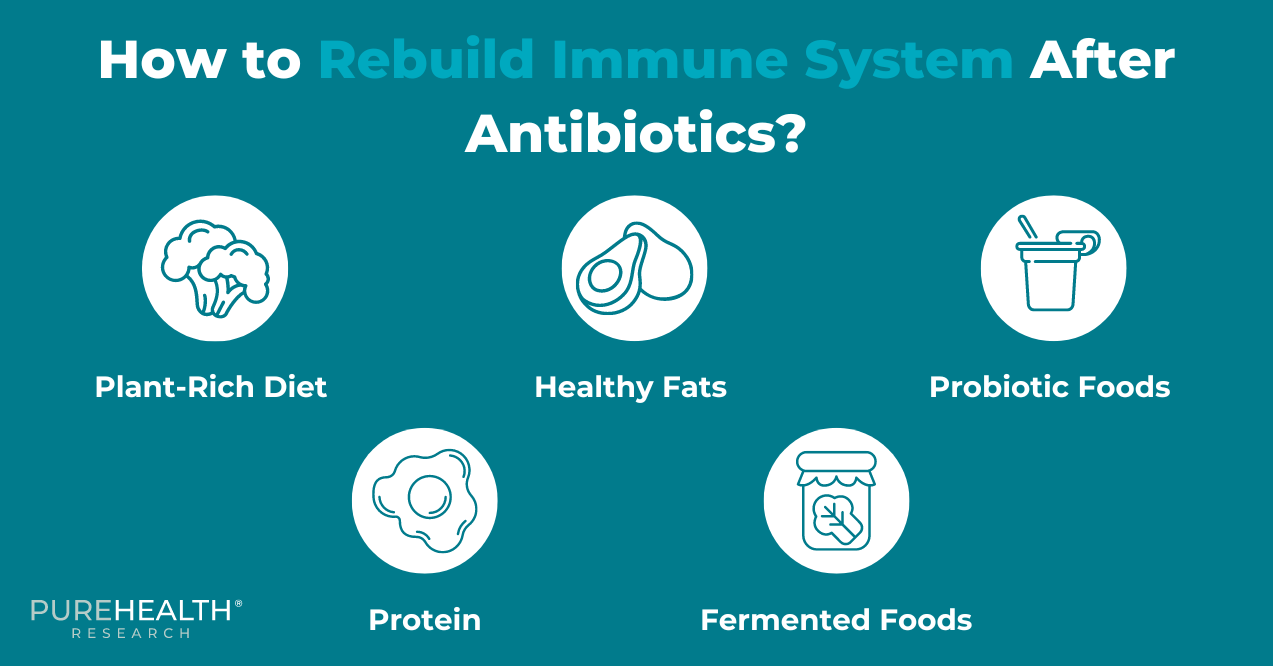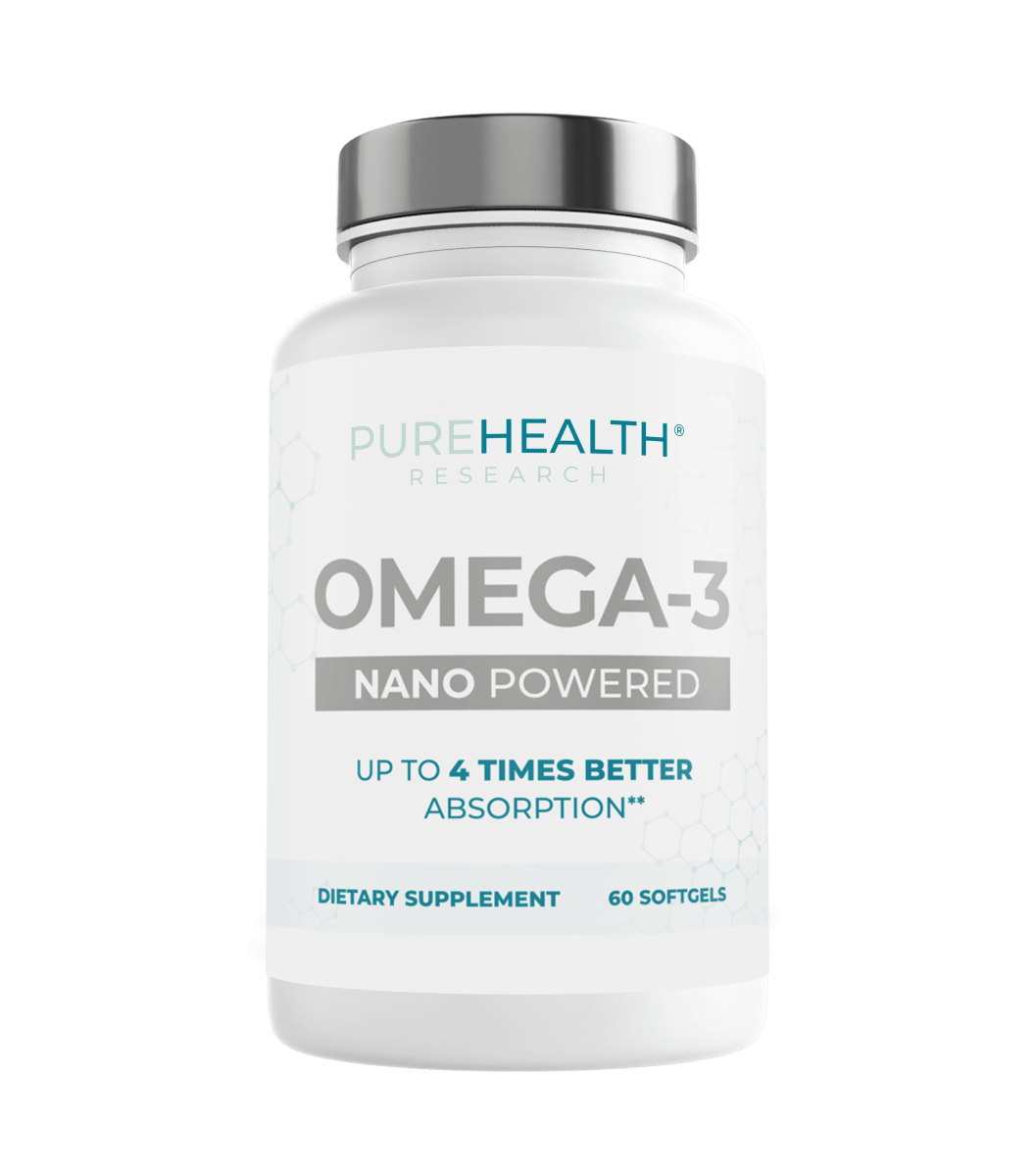How to Rebuild Immune System After Antibiotics: 5 Best Steps
Medically reviewed by our experts


How to rebuild the immune system after antibiotics?… It’s a question many of us, especially as we get older, find ourselves asking. Over the years, antibiotics have been like superheroes, warding off nasty infections and adding years to our lives. But, as with many superheroes, there’s a bit of a downside.
While they tackle the bad bugs, they sometimes sideline our good gut buddies – the friendly bacteria that help us feel our best. So, how long does it take to rebuild the immune system after antibiotics? And for those of us with kids or grandkids, we might also be curious about how to rebuild a child’s immune system after antibiotics.
But there’s good news! In this guide, we’ve compiled five straightforward steps to help you and your loved ones boost your immunity and get back on track after antibiotic use.
How Does the Immune System Work?
Your immune system is like a well-coordinated security team working 24/7 to protect your ‘home’ – your body – from harmful invaders. Think of bacteria, viruses, and other pathogens as unwelcome guests trying to get in.
Innate Immune System
Imagine there’s an intruder in your house. The innate system is like your home alarm that goes off instantly. It doesn’t pick and choose its battles – it’s an immediate response force. Key parts of this system include:
- Physical Barriers: Your skin and the lining of your mouth and nose, act as walls and fences, blocking many germs.
- Patrolling Cells: Always on the lookout! When they spot something fishy, they act quickly. Cells like neutrophils and macrophages are part of this always-alert team.
Adaptive Immune System
Let’s say an intruder is tricky and keeps trying different tactics. The adaptive system is like hiring a specialized security firm that learns and adapts. It builds a defense that’s precise and unique for each germ it meets:
- Memory Cells: They keep records of past invaders. If the same germ returns, these cells recall how to tackle them effectively.
- Tailored Defenses: T-cells attack infected cells directly, while B-cells produce antibodies to target specific germs.
When a germ enters your body, these systems spring into action. The innate system reacts immediately, raising the alarm. As it fights off the intruder, the adaptive system is learning, preparing a precise plan. It might take a little longer, but it’s thorough. Once it knows the intruder, it remembers them, ready to defend swiftly if the same germ tries its luck again.
Together, the innate and adaptive systems form an incredible duo, ensuring you’re well-defended against any unwelcome guests that come your way.
What Are the Effects of Antibiotics on the Immune System?
When you’re sick with a bacterial infection, antibiotics can be life savers. They’re specifically designed to target and eliminate harmful bacteria in our body, aiding the immune system in its fight. In such cases, they complement the immune system’s natural defenses and help speed up recovery.
The Gut Microbiota and Antibiotics
Our gut is home to trillions of microbes, many of which are essential for our overall health. These microbes play crucial roles, from helping digest food to producing vital vitamins and even regulating our immune responses. When antibiotics are introduced, they don’t discriminate between “good” and “bad” bacteria; they target both. This can lead to a significant reduction in beneficial bacteria, disrupting the harmony of our gut microbiome.
Weakening of Immune Responses
The reduction of beneficial bacteria in our gut can have ripple effects on our immune system. These good bacteria train our immune cells, help regulate immune responses, and keep harmful bacteria in check. When their numbers diminish, our body’s ability to fend off other infections can weaken, making us more susceptible to other illnesses.
The Rise of Superbugs
Repeated and inappropriate use of antibiotics doesn’t just harm our immediate immunity. Over time, some bacteria evolve and develop resistance to commonly used antibiotics. These “superbugs” are much harder to treat and can pose severe health risks. When our primary defense (antibiotics) against these harmful bacteria becomes less effective, our immune system has to work even harder, sometimes with diminished success.
How to Rebuild Immune System After Antibiotics?
Post-antibiotic care is essential. Our immune system, while resilient, can use a helping hand after a course of antibiotics. Here are five effective ways to strengthen your immune system through your diet:

1. Plant-Rich Diet for Immune Recovery
Fruits and Vegetables:
When thinking about how to rebuild the immune system after antibiotics, it’s crucial to incorporate fruits and vegetables. Packed with vitamins and antioxidants, these foods significantly enhance the body’s defenses against infections.
Whole Grains, Legumes, Nuts, and Seeds for Long-term Immune Health:
Many wonder how long it takes to rebuild the immune system after antibiotics. While the timeline can vary, including whole grains, legumes, nuts, and seeds in your diet can accelerate the process. These foods not only offer energy but also supply essential minerals beneficial for gut health, a key component in immunity.
Healthy Fats for Immune Regulation:
For those researching how to rebuild a child’s immune system after antibiotics, it’s worth noting that plant foods, being low in saturated fats and rich in beneficial fats like omega-3s, play a pivotal role. Omega-3 fatty acids, in particular, are instrumental in immune regulation, ensuring optimal functionality across all age groups. Always check with your pediatrician.
2. Healthy Fats for Immune Vitality
Don’t simply consider foods like avocados, nuts, olive oil, and fatty fish as mere treats. These choices are brimming with omega-3 fatty acids and a wealth of nutrients that play a crucial role in fine-tuning our immune response. Found in abundance in these foods, omega-3s are known for their ability to reduce harmful inflammation, ensuring a balanced immune reaction.
Uncover the science, and you’ll realize that these healthy fats contribute to the integrity of cell membranes. This integrity is vital for seamless communication between immune cells, facilitating coordinated responses against threats.
Beyond their direct impact on immune function, these fats also assist in the absorption of fat-soluble vitamins, such as A, D, E, and K. These vitamins are essential tools that equip the immune system for robust and efficient defense.
3. Probiotic Foods for Immune Restoration
For those curious about how to rebuild the immune system after antibiotics, probiotics should be at the forefront of your dietary considerations. These friendly bacteria, abundantly found in foods like yogurt and kefir, play a fundamental role in promoting a balanced gut environment.
Probiotics for Antibody Production and Immune Cell Activation:
If you’ve been wondering how long it takes to rebuild the immune system after antibiotics, incorporating probiotics can expedite the recovery. By consuming foods rich in probiotics, you stimulate the production of antibodies and activate immune cells, equipping your body with tools to ward off infections effectively.
Probiotics for Children’s Immune System:
For parents concerned about how to rebuild a child’s immune system after antibiotics, probiotic-rich foods like tempeh offer a solution. These foods not only enhance the protective barrier of the gut but also ensure the young immune system is fortified and prepared for any challenges.
4. The Importance of Protein in Immune Recovery
For those seeking knowledge on how to rebuild the immune system after antibiotics, protein is a key component. Foods such as lean meats, poultry, fish, legumes, and seeds provide crucial elements that our body needs for optimum immune function.
Protein is a core component in the generation of antibodies, specialized proteins that target and neutralize harmful pathogens. Adequate protein intake ensures the body has the resources to create a diverse array of antibodies, enhancing the immune system’s effectiveness.
Additionally, protein plays a crucial role in producing signaling molecules that facilitate communication between immune cells. This communication is essential for orchestrating immune responses and mounting defenses against infections.
5. Fermented Foods in Immune Health
If you’re looking into how to rebuild the immune system after antibiotics, fermented foods should be on your radar. Common examples include sauerkraut and kimchi, which are known for their rich probiotic content.
Beyond just probiotics, the fermentation process introduces other beneficial compounds that enhance gut health. These compounds have demonstrated abilities to reduce inflammation, a key factor in maintaining a healthy immune response.
Benefits for Children:
Parents seeking to understand how to rebuild a child’s immune system after antibiotics should consider incorporating fermented foods. They offer essential nutrients that help fortify young, developing immune systems.
How Long Does It Take to Rebuild the Immune System After Antibiotics?
Antibiotics have revolutionized modern medicine, effectively treating various bacterial infections that were once deadly. However, their impact on the gut microbiota, a central pillar of our immune system, raises a common question: How long does it take to rebuild the immune system after antibiotics?
A Complex Recovery Timeline
Recovery after antibiotic treatment is not one-size-fits-all. The timeline varies, depending on factors such as the type of antibiotic taken, treatment duration, and individual health. While some components of the gut microbiota can bounce back rapidly post-antibiotics, others may lag behind. In fact, one study highlighted that the gut environment might not return to its initial state even six months after stopping antibiotics.
While gut health plays an undeniable role in our immune responses, our immune system’s resilience comes from its intricate web of cells, tissues, and signaling compounds. Its multifaceted nature ensures that even if one component faces challenges, the system as a whole continues its protective role. Remember, a temporary reduction in gut microbiota diversity due to antibiotics doesn’t mean our entire immune defense is compromised.
For those wondering about their immune system’s prowess post-antibiotics, it’s pivotal to focus on holistic health. A balanced diet, regular exercise, adequate sleep, and effective stress management play crucial roles in nurturing our immune system. These elements, combined with the adaptive nature of our immune defenses, ensure we remain safeguarded against potential threats.
While antibiotics might momentarily alter our gut’s bacterial landscape, the immune system’s dynamism and adaptability shouldn’t be underestimated. Always work alongside healthcare professionals for tailored advice and stay informed about the latest research to ensure optimal immune function in the wake of antibiotic treatment.
How to Rebuild a Child’s Immune System After Antibiotics?
Post-antibiotics, a child’s developing immune system needs careful support:
- Complete the Antibiotic Course: Ensure your child finishes the prescribed treatment to prevent bacterial resistance.
- Nutrient-Rich Diet: Prioritize whole foods like fruits, vegetables, whole grains, and lean proteins to fortify immunity.
- Embrace Physical Activity: Regular play enhances circulation, promoting overall health.
- Prioritize Sleep: A consistent bedtime routine ensures restful sleep, crucial for immune rejuvenation.
- Limit Sugars and Processed Foods: These can hinder immune efficiency.
- Consult with Pediatricians: Stay connected with your child’s doctor for tailored advice and guidance.
Remember, individual needs vary; adjust and adapt as necessary for your child’s well-being. Always check with your pediatrician.
Rebuild Your Immune System With Supplements
Supplements, when combined with a nutritious diet and active lifestyle, can be a robust tool in boosting your immune system:
- DHA (Docosahexaenoic Acid): An omega-3 fatty acid, DHA is integral for brain health and possesses anti-inflammatory properties, which can be beneficial in supporting the immune system. It’s primarily found in fatty fish and certain algae.
- EPA (Eicosapentaenoic Acid): Another essential omega-3 fatty acid, EPA, is recognized for its role in managing inflammation in the body and supporting cardiovascular health, further assisting in immune system function. Like DHA, fatty fish is a prime source.
- Astaxanthin: A potent antioxidant present in specific algae and seafood such as shrimp and salmon, astaxanthin is revered for its immune-boosting and anti-inflammatory capabilities.
- Vitamin E: A fat-soluble antioxidant, Vitamin E plays a vital role in regulating and maintaining immune system function. Nuts, seeds, and green leafy vegetables are excellent sources.
Recommended by Dr. Holly Lucille, this product utilizes nanotechnology, this product ensures optimal absorption, positioning it as a favorite for many desiring immune enhancement.
Nonetheless, before integrating any supplements for immune system into your routine, it’s imperative to consult a healthcare professional. This ensures their appropriateness based on your individual health profile and any medications you might be taking.
Final Thoughts
Rebuilding your immune system after a course of antibiotics requires patience and commitment to a healthy lifestyle. By nourishing your body with a balanced diet, staying hydrated, getting adequate sleep, engaging in regular exercise, and managing stress effectively, you can support your immune system’s recovery. Remember that small changes can have a significant impact on your overall health, and always consult with a healthcare professional if you have specific concerns about your immune system or post-antibiotic recovery process.
As you embark on this journey to rebuild your immune system, keep in mind that consistency is key, and over time, you’ll likely notice improvements in your resilience to infections. Empower yourself with knowledge, make informed choices, and prioritize self-care to achieve a vibrant and thriving immune system in the years to come.
Popular Articles
Advertisement. This site offers health, wellness, fitness and nutritional information and is designed for educational purposes only. You should not rely on this information as a substitute for, nor does it replace, professional medical advice, diagnosis, or treatment. If you have any concerns or questions about your health, you should always consult with a physician or other health-care professional. Do not disregard, avoid or delay obtaining medical or health related advice from your health-care professional because of something you may have read on this site. The use of any information provided on this site is solely at your own risk.
















